Small Blessings: Volunteers Give Proper Burials to Babies
From building tiny coffins to funerals, dignity and respect are offered to precious lives lost too soon.

The cypress is sanded smooth as glass, and it’s coated with a clear sealer to showcase the beauty of the wood. Each piece is connected to the next with biscuits, small football-shaped pieces of wood that fit snugly into carefully sized slots; the only metal is the hinge that connects the lid to the coffin itself. In that lid is cut a cross, traced over with gold; in that lid is also carved the name of the baby who will rest inside.
“All of the coffins are personal to the babies,” explained Don Sampey, who runs this woodworking operation from a small structure in his Metairie, Louisiana, backyard.
“We know the name of the baby, the history of the baby — all of that.”
The coffin ministry got its start about a year ago, when the woman who looks after Sampey’s handicapped son confided that her granddaughter had been stillborn, and her son couldn’t afford to bury the baby.
“We were standing in the kitchen, trying to figure out how to help him,” Sampey recalled.
Then he heard about Compassionate Burials for Indigent Babies (CBIB), an organization that provides precisely the service they needed.
“I got in touch with them and wound up making the coffins for the babies,” Sampey said.
“At the time, I couldn’t even spell woodworking. But the good Lord put it on me to do that.”
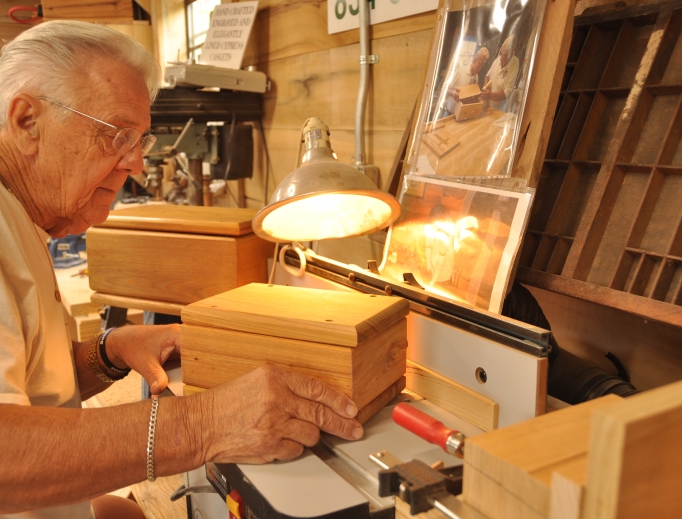
Beauty in the Darkness
CBIB has buried more than 100 babies since 2003, offering monthly funerals. Each is attended by about 60 people, including the “Monday Night Disciples” — a Catholic men’s prayer and fellowship group to which Sampey belongs and from which he draws his workshop volunteers — and the Knights of Columbus. Each funeral honors anywhere from one to six babies.
“We have an unbelievable ministry, which I think is just [attributable to] God,” said CBIB founder Lise Naccari.
“They need to have some respect and a final resting place,” she said of the babies. “And that’s what we do.”
Like Sampey winding his way to crafting coffins with his team of volunteers, Naccari took a circuitous route to establishing the organization.
About 15 years ago, she was watching Father Frank Pavone on EWTN. He was speaking about the sale of aborted babies’ organs and how much money was involved. The next day, she told her mother, “Mom, I have to bury those babies.”
Her mom agreed: “Lise, that’s what you have to do.”
Not long after, her mother passed away — and around the same time, New Orleans Right to Life invited Naccari to be on its board.
It was at her second board meeting that she heard a horrific story about a pregnant teenager who — at the urging of her mother — made an appointment to abort her baby. The clinic induced labor and sent the teen home, where she experienced increasing pain, ultimately delivering the dead baby — and nearly dying in the process.
“I buried this baby, and it was the first baby I buried, and it was an aborted baby,” said Naccari. “Both parents came [to the funeral] and the grandmother who had insisted on her going to the abortion clinic.
“I put my arms around this mom, and I told her, ‘I’m a sinner too, and God loves you.’
“That’s really our message with all of the things that we do.”
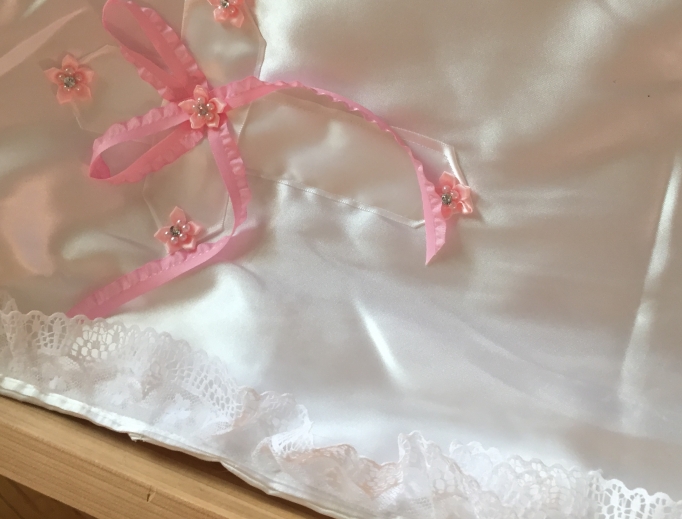
Human Dignity
Naccari has one incredible story after another of families who have been touched by this ministry, from the parents who had a stillborn baby and wanted to know what to do next to the Texan who called and wondered what to do for a miscarried baby; since the baby was less than 20-weeks gestation, the family couldn’t get a death certificate, often needed in order to have a burial.
“We’re showing respect to human life,” emphasized Naccari. “Whether [a baby is] one-inch long or 2 years old, this is about respect for human life: to show dignity, the worth of human life, and they don’t belong in the trash can.”
“I get people who have murdered their babies — babies thrown in the trash can, babies found in the sewer, babies found in the garbage compactor,” she reported. “I have to deal with a lot of bad things … but it’s the most beautiful ministry.”
This ministry is the missing piece in the pro-life movement, according to Louisiana Right to Life Executive Director Benjamin Clapper.
“CBIB has filled a void in the pro-life movement by paying respect to those babies whose lives were far too short, whether due to abortion, miscarriage or another reason,” he said. “It is our hope that CBIB’s witness would inspire other groups across the nation to pick up this critical work of mercy.”
CBIB’s ministry is unique, but the effort to honor the humanity of aborted and other lost babies is more common than many realize.
The National Memorial for the Unborn was founded in Chattanooga, Tennessee, in 1994, on the site where an abortion facility had performed 35,000 abortions. It is home to a “Wall of Names,” where people who have lost a baby to abortion can honor that child; for the past 10 years, the National Memorial has offered brick pavers in its garden to remember babies who died due to miscarriage, stillbirth or early infant death. And all across the country there are burial sites and memorials in memory of babies killed by abortion.
“One common need of families of aborted children is for a unique place of healing ... a place where loss and grief can be shared with others who have suffered similarly, a place where the unborn can be honored and remembered in a tangible way, and a place of closure,” the National Memorial explains on its website.
Together, all these locations and organizations strive to facilitate that healing — and to honor the dignity of those unborn children. And in the meantime, volunteers like Sampey find themselves powerfully impacted by their work.
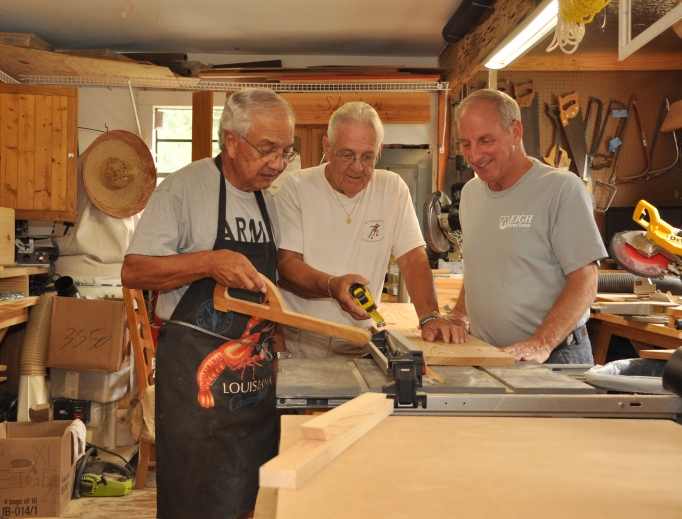
Sampey proudly describes his backyard as a “bus station,” where volunteers come and go, each knowing what he needs to do and getting down to it. Sampey has doubled the size of his storage shed to make space for all of the woodworking equipment donated to the Skylar Project, named for the baby whose death led him to make these tiny coffins.
“You know about the purity of what’s getting ready to take place,” Sampey said of the process of crafting coffins for these precious babies.
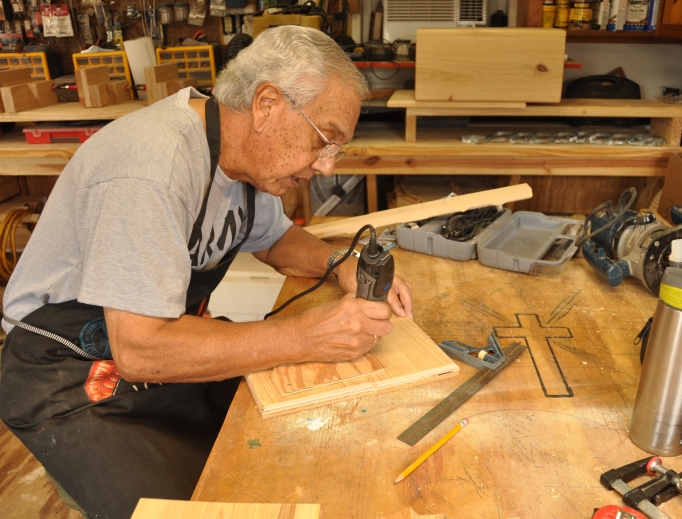
“That’s why everything is white. That’s why the wood selection is the best. That’s why the wood is not stained. And the cross that’s engraved into the wood is traced over with gold, which is the most precious metal on this earth.
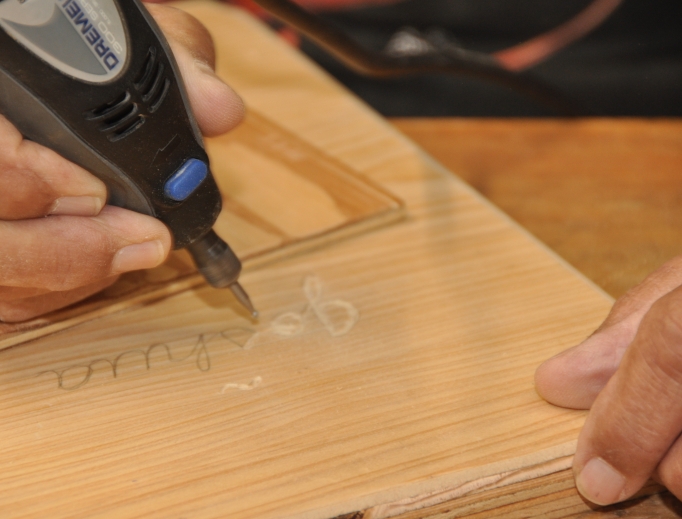
“You’ve got precious babies, and precious metal, and the finest wood. It’s sort of like putting something together that’s unstained.”
Elisabeth Deffner writes from Orange, California.
INFORMATION
To learn more about Compassionate Burials for Indigent Babies and how you can help, go to CBIBINC.com.
- Keywords:
- dignity of human life
- elisabeth deffner

















